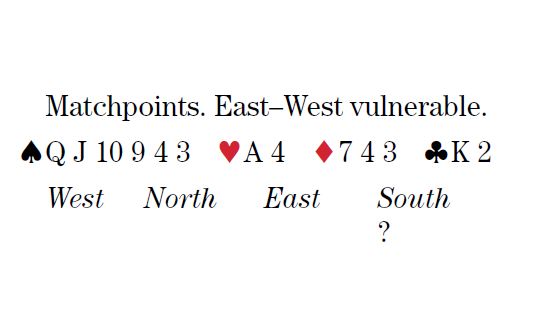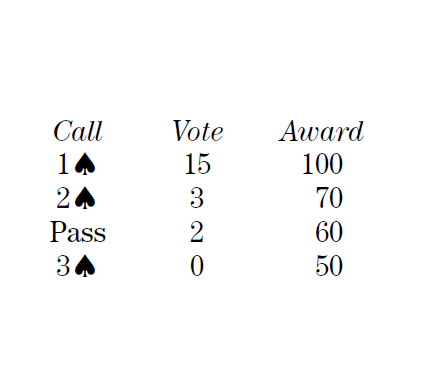
What’s your call?
| 1♣ | 1♦ | 1♥ | 1♠ | 1NT |
| 2♣ | 2♦ | 2♥ | 2♠ | 2NT |
| 3♣ | 3♦ | 3♥ | 3♠ | 3NT |
| 4♣ | 4♦ | 4♥ | 4♠ | 4NT |
| 5♣ | 5♦ | 5♥ | 5♠ | 5NT |
| 6♣ | 6♦ | 6♥ | 6♠ | 6NT |
| 7♣ | 7♦ | 7♥ | 7♠ | 7NT |
| Dbl | Pass |
Opening salvo
Too little to open one, too much to open two? The experts are decidedly — though not unanimously — in favor of opening 1♠ with this hand.
“At favorable vulnerability, this hand is much too heavy for a weak two-bid,” declares Meckstroth.
“We are the wrong color for a preempt,” echo the Joyces.
“This hand must be opened and it is too good for a weak 2♠ bid,” states Stack. “The hand contains one and a half quick tricks for defense and a great suit to bid and rebid so that there will be no problems in the bidding except that we may get overboard. Partner would never expect a hand this good if we open a weak two-bid.”
Lawrence, too: “Much too good for 2♠. When you have all prime values such as this, you bid one, not two. If you had no ♣K and the ♦Q x x and ♣J x, this would be a 2♠ bid. If your hand was rearranged a little,
♠Q 9 8 5 4 3 ♥A J ♦J x x ♣Q 10,
it would be a pass.”
The Sutherlins call it a matter of style. “Not vulnerable, we open 1♠.”
The Coopers describe the hand as “too good for a weak two in our style. We do not pass with a good six-card major — we open one or two, depending. This is 10 HCP, so above our weak-two range at favorable vulnerability. It is also a seven-loser hand, which is an opening one bid.”
Boehm says, “It’s not my style to preempt with two outside features. Thanks for the ♠10 9.”
“If the ♠10 were the deuce, I would open 2♠ and feel that I was at the very top of my range,” reasons Weinstein. “With the ♠10, the hand is just too good to preempt.”
The ♠9 dictates Rigal’s 1♠. “Vulnerable, this is a weak two. NV, that tempting ♠9 persuades me to treat the hand as a one-level opener. If I’m wrong, I’ll blame those intermediates.”
“These days, 1♠ is scarier to the vulnerable opponents than 2♠,” Falk suggests. “If I bid 2♠ and it went 3♦–Pass–Pass back to me, I’d feel I should do something, which is why 1♠ wins my vote.”
Colchamiro bids 1♠, calling the hand “the price we pay for modern, nonvulnerable-versus-vulnerable first-seat preempts.” He adds, “Pass is my second choice with 2♠ a non-choice. If I was vulnerable, the two outside cards would preclude me from opening 2♠.”
Cohen is a 2♠ opener. “My heaviest, weak two-bid ever, and in print yet!”
Hampson opens 2♠: “Sometimes one gets dealt a maximum.”
The Gordons, too: “Yes, we have two outside controls. But we have a good suit and a hand that doesn’t approach being a one-level opening.”
Meyers passes. “Too good for 2♠, not good enough for 1♠.”

